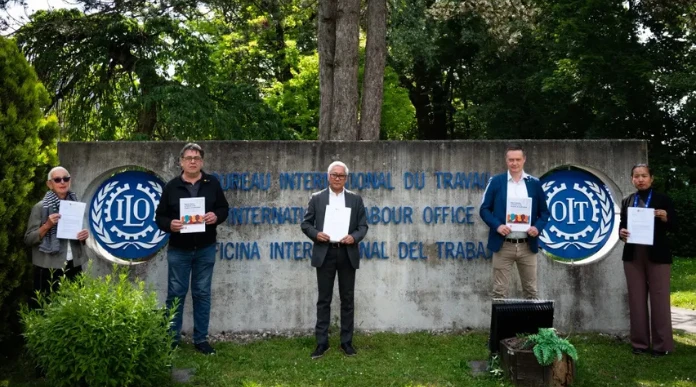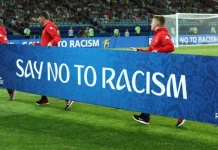In recent years, Saudi Arabia has aggressively pursued a strategy to raise its global image by hosting major global events. The most significant of these is its bid to host the 2034 FIFA World Cup. While the country hosting the world’s most popular sporting event should provide huge opportunities for tourism and global publicity, Saudi Arabia’s record on labor rights and migrant workers record raises extreme concerns. Sixty-three percent of surveyed workers reported being unable to freely terminate their employment. The country’s systemic violations of labor laws, along with the mistreatment and abuse of migrant workers, make them unfit for hosting FIFA World Cup 2034.
The Kafala system and its implications
Central to Saudi Arabia’s labor rights problems is the Kafala system, a sponsorship application that effectively connects migrant workers with their employers and puts them at the mercy of their bosses. Under this system, people cannot trade for work or leave the country without the permission of their trading company. Moreover, around 85% of indebted workers are unable to leave their jobs without obtaining permission.
Many migrant workers who have strict labor jobs find themselves in poor working conditions, wage withholding and forced hard labor. The Kafala system has been criticized worldwide as a form of contemporary slavery. Hosting the World Cup would require the country to build new infrastructure, stadiums, resorts, and transportation networks. This could further increase the demand for migrant labor and increase the chance of exploitation.
Abuse and Exploitation of Migrant Workers
The exploitation of migrants in Saudi Arabia is well documented. Migrants from countries such as India, Pakistan, Bangladesh, and the Philippines flock to Saudi Arabia in search of better money opportunities but often find themselves trapped in abusive working environments. Reports by Human Rights Watch (HRW) and Amnesty International often highlight the number of such abuses, such as cases of forced labor, physical abuse, and non-payment of wages.
According to the 2023 Global Slavery Index, around 740,000 individuals in Saudi Arabia are estimated to be living in conditions of modern slavery, resulting in a prevalence rate of 21.3 per 1,000 people in the country.
For example, domestic workers, many of whom are women often face the most extreme abuse. Many are pressured to work long hours and take no rest days, and there are various reviews of physical, sexual, and psychological abuse. Saudi Arabia’s legal guidelines exclude domestic workers from many protections, making them particularly vulnerable to exploitation.
Lack of Freedom
In addition to the abuses faced by migrant workers, they are also denied the simple rights of freedom of expression and association. Saudi Arabia bans independent trade unions, and workers who attempt to organize or strike in protest of its operating conditions face severe penalties, including detention and deportation. In a crackdown on undocumented migrants, over 468,000 foreign nationals were deported in a single year due to labor violations.
This denial of workers’ rights to organize deprives them of the ability to demand higher pay, safer working conditions, and enforcement of existing legal guidelines for hard work. Without a platform to voice their concerns, workers are left vulnerable to exploitation and employers operate with impunity. This lack of freedom is not just hard work; it’s miles a human rights issue. When a country silences the voices of employees and prevents them from advocating for their rights, it can create a lot of issues.
Inadequate Labor Reforms and Enforcement
In response to global criticism, Saudi Arabia has implemented several labor reforms aimed at improving the situation of migrant workers. These include modifications to the Kafala facility, along with allowing workers to change jobs without company approval under certain circumstances, and the development of a salary protection gadget to ensure well-timed bills. However, these reforms have been criticized for being insufficient and for insufficient enforcement.
A recent complaint lodged by the Building and Wood Workers’ International Union revealed that 63% of migrant workers are unable to freely terminate their employment, and 85% of indebted workers cannot leave their jobs. Furthermore, 46% of workers reported experiencing delays or withholdings in their wages.
Many employers are still finding ways around these legal guidelines, and liability mechanisms are vulnerable. Staff are often afraid to report abuse for fear of retribution or deportation, and prison facilities provide few options for people brave enough to return.
Moral and ethical concerns
Beyond the direct abuses faced by migrant workers, Saudi Arabia’s broader human rights record raises extreme moral questions. It has long been criticized for its gender inequality, restrictions on freedom of speech, and persecution of political dissidents. While these issues may not appear to be linked to hard labor rights, they are part of an identical authoritarian system that allows for the exploitation of migrant workers. A country that does not value the basic rights of its citizens will not favor the niceness of overseas workers.
Awarding the World Cup title to Saudi Arabia could also add to the problems with the message it broadcasts to the world wide web. Hosting this type of prestigious event in a country with a terrible human rights record could provide a form of legitimacy and normalization to the Saudi regime, undermining efforts to hold it accountable for its abuses. It could be argued that executive rights and human rights are secondary to economic and political issues, a risky precedent on a global scale where many nations come into conflict with comparable issues.
Conclusion
Saudi Arabia’s bid to host the 2034 FIFA World Cup must be rejected due to its systematic abuse of migrants, exploitative practices, and failure to protect basic human rights. Hosting the World Cup in a rustic setting where migrants face abuse and exploitation could tarnish the reputation of the sporting event. Moreover, it will contradict FIFA’s commitment to promoting human rights. Without major and significant reforms to its enforcement laws and human rights practices, Saudi Arabia remains unfit to host an event that should represent equality, equity, and admiration for all, regardless of their history or career.













